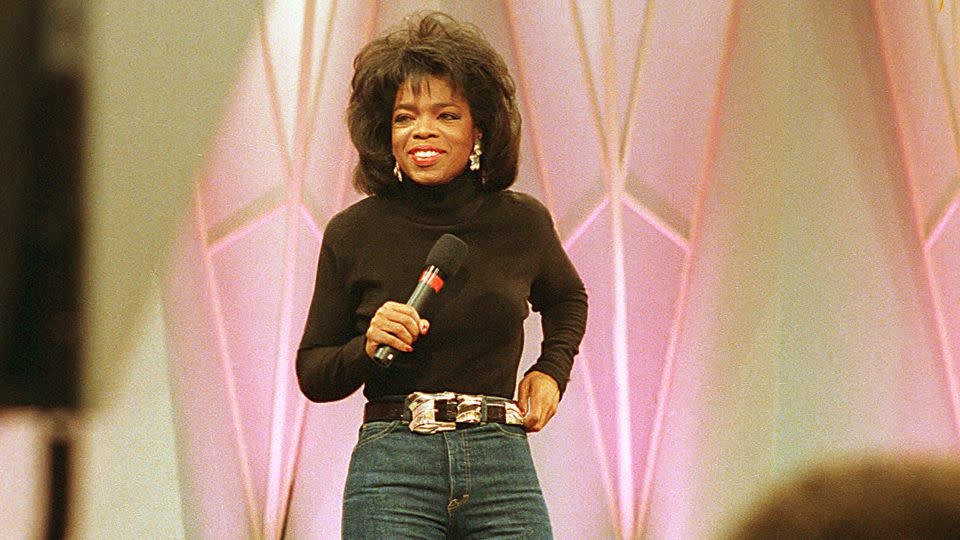Opinion: What Oprah’s departure from WW means for the rest of us
- Oops!Something went wrong.Please try again later.
Editor’s Note: Kellie Carter Jackson is the Michael and Denise Kellen ’68 associate professor in the Department of Africana Studies at Wellesley College. She is the author of “We Refuse: A Forceful History of Black Resistance” and co-host of the podcasts “This Day in Esoteric Political History” and “You Get a Podcast!” The views expressed here are hers. Read more opinion on CNN.
This week, Oprah Winfrey announced that she would be stepping away from the board of the Weight Watchers (WW) brand and divesting her 10% share in the company. Many will remember when Oprah began her partnership with WW nearly 10 years ago. At the time, the company was struggling to make new profits and Oprah’s Midas touch took the company and its stock to new levels.
Who can forget Oprah’s famous “I. Love. Bread.” commercial? With taglines such as: “Eat bread. Lose weight. Whaaatttt?” She too, had me at bread. I can recall joining WW shortly after the birth of my second child during the early years of Oprah’s partnership. For decades, America has followed Oprah through every major weight loss trend, and this was no exception.
During the height of Oprah’s daytime talk show, viewers tuned in five days a week to learn about “how to live their best lives.” Oprah illustrated the many ways one achieved wellness, and for better or worse the theme of weight loss dominated her 25-year run. In 1988, she infamously rolled out 67 pounds of animal fat in a red wagon to illustrate the weight she lost from a 30-day liquid only diet. She later deeply regretted such a stunt, calling it a “Big, big, big, big, big, big, big mistake!”
In 1994, Oprah ran her first marathon to celebrate her 40th birthday. Her time during the Marine Corp Marathon was 4:29:15, which became the benchmark to beat for any celebrity that wanted to best Oprah. She graced the cover of “Runner’s World” in matching spandex coral colored sports bra and running shorts with the headline: “Oprah Did it, So Can You.” In 2008, Oprah kicked off a vegan craze, where she and the entire staff at Harpo Studios, her production company, opted to eat vegan for a short time.

All throughout her professional life, Oprah’s struggles with weight loss and gain have been iconic. But this year, Oprah also turned 70 years old, and the public still cannot relinquish its gaze on her body or health journey. During her red carpets events for the premiere of “The Color Purple,” the internet became obsessed again with Oprah’s small waistline and thinner figure. It raised questions about Oprah taking medical weight loss drugs such as Ozempic or Wegovy. Known for transparency, she shared she was indeed taking weight-loss medication. Perhaps she hoped that her own choices would remove the stigma that comes from medical intervention.
WW has also strategically launched a plan for its members to take advantage of weight loss drugs and even telehealth services to offer virtual prescriptions for patients when applicable. Oprah’s departure from WW comes at an interesting moment in our weight obsessed culture.
What happens when our aspirations for “living our best lives” no longer requires 30-day liquid diets, marathons or going vegan? While many will certainly see this as a progressive change, I am not confident that Oprah’s leaving WW is a mission accomplished moment. The solution to weight loss appears to be “take the shot” or “pop a pill.” In various ways, it feels like the culture has punted on figuring out what “fat” actually is. Scientists still have no definitive answers about what makes someone fat; it is not just what you eat or how much you eat. Most of America is convinced that fat or obese people are always unhealthy: not true. The public is also generally deceived into the idea that skinny people somehow can’t be unwell. These ideas harm everyone.

With Oprah stepping down, many people will lose their measure or point of reference for what is ahead or behind the curve as it relates to their weight and health. Hollywood has taken its fixation with thinness to new levels. But celebrity voices are hardly needed anymore when social media influencers can stir the culture just as much with their medical weight loss journeys for all to see. The dopamine shot from dropping another few pounds is drowning out all of the canaries in the coal mine that call out the potentially harmful side effects of Ozempic and other similar drugs.
Oprah’s departure will also have particular meaning for the Black community. As a result of her announcement, WW stock plunged 25% in value. Oprah stated that she will be donating the shares of her stock to the National Museum of African American History and Culture. While it may seem like a significant donation to the museum, the shares are only as valuable as the company, which just took a major hit. In order for the museum to see a boon, the company will have to continue to do well. One might also ask what it means for the nation’s preeminent Black history museum to be economically tethered to a weight loss company.
Ultimately, Oprah can do whatever she wants with her money, her time and her talents. Stepping down is her prerogative. But perhaps, it’s finally time that our culture also relinquishes its obsession with Oprah’s body — and along with it, its anti-fat bias and attachments to seemingly quick-fix solutions to much bigger problems.
For more CNN news and newsletters create an account at CNN.com

